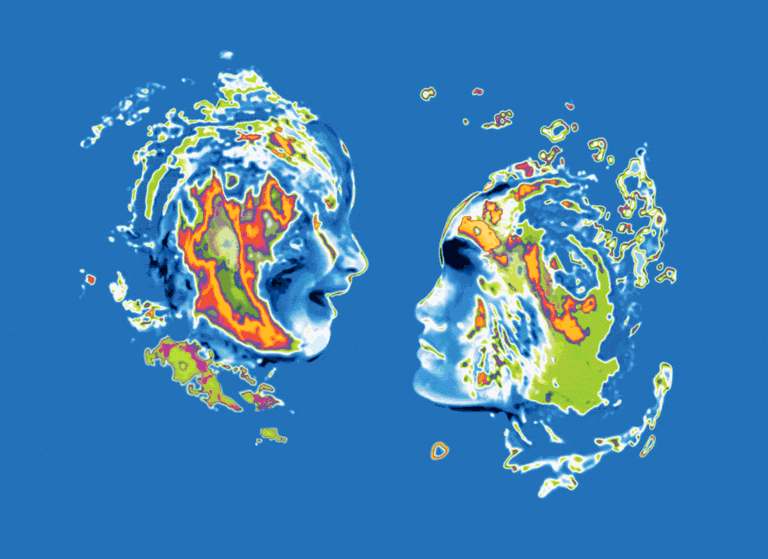Often considered a dull conversation topic, the weather actually leaves room for creativity and panache.

It hit a heavy, humid 90 degrees as I was walking up Sixth Avenue to get my kid from the LARPing camp we signed him up for, and my shirt clung to my skin like seaweed. Then, mercifully, a breeze picked up. And picked up some more. A woman around my age approached, pushing a toddler in a stroller. “Ah,” she said, beaming. “That wind!” She took her hands off the stroller, letting it roll, and stretched her arms out like wings. Her sleeves billowed, and she said, half to me, half to the kid, “I want to let it carry me!”
The image she conjured brought a smile to my face. As we passed each other and nodded goodbye, I pictured the three of us airborne, floating skyward like Mary Poppins — human kites, flying away on the God-sent breeze and good cheer.
Weather conditions affect us all, quite obviously, which is exactly what makes them such oft-abused fodder for discussion. You can know nothing at all about the person you happen to pass on the sidewalk or stand behind in line at the deli or find yourself in an elevator with, but you know one thing that they’re enduring or enjoying or otherwise experiencing because you’ve been experiencing it, too. If you’re searching for something to say, nothing could be more apparent. For this reason — banality — talking about the weather has gotten a bad rap. Oscar Wilde is said to have called it “the last refuge of the unimaginative.” (This is actually untrue — he said this of consistency — but so widely repeated on the internet that it must reflect some deep-seated cultural hatred.)
I disagree with this notion, sort of. Or rather, I think the boringness is part of what makes it a worthwhile endeavor. Mundane conversations like these are the way we practice being around other people. We all do it, either by choice or under duress, very often, so much so that most of us have the basic format memorized, whether we realize it or not.
Person 1: Boy is it [variable weather condition] outside.
Person 2: It sure is! I can’t remember the last time it was so [variable weather condition].
Person 1: Well, I guess it’s better than [extreme opposite of current weather condition].
Person 2: It’s getting so crazy these days. [Something about climate change.]
It is, indeed, pretty boring. So, Wilde would ask, why bother?
Because, I would argue, great challenge and pleasure come in creating something novel out of the routine. What I admire is talking about the weather in a way that makes it something other than a miserable and tedious experience, a mere overwriting of what would otherwise be an unmemorable interaction or, worse, a prolonged, awkward silence. What I’m talking about is talking about the weather with style.
It is precisely the superficiality of talking about the weather — of something so common, so pedestrian — that, contra Wilde, makes it a blank canvas upon which talented people can work wonders. And, as is often the case with art, the strictures of the form can inspire small-bore, tight-focus creative excellence. With just the slightest bit of effort, a boring conversation is suddenly filled with allusions to Siberian graveyards and stolen flamethrowers, polar bears’ toenails and Georgia asphalt in July. I remember my father, shoveling snow off our driveway in New Jersey after a winter storm, greeting a neighbor with a crude colloquialism. “Colder than a witch’s tit in a brass brassiere,” he said, breath freezing in the air. As for summertime, well, I don’t know if you’ve ever heard the one about the sexually frustrated woodland creature trapped in a forest fire. You won’t read it in The Times, but trust me, it’s a good one.
A vast reservoir of clichés has developed over generations of these supposedly lame conversations, a byproduct of the ingenuity the topic demands. And now even these clichés can be amusing for the fact that they’re so tired. I’m being serious when I say that in the hands of a master conversationalist, a well-timed, perfectly placed “Hot enough for you?” can serve delight on a very hot day or (even better) a very cold one. (“It’s not the heat, it’s the humidity” is starting to gain similar status.) It reminds us, by dint of its banality, of our common, corny American heritage. This is hardly boring; it’s democratic, a shared language that allows us to connect with strangers easily, noncommittally and without causing offense.
Just the other day, it hit 80 degrees in April, and I was talking about it with the barista at a new coffee place that opened in my neighborhood. I was saying how miserable it was to have skipped right past spring and plunged into the swampy heat of summer so soon. “New York City gives you like one week of spring and one week of autumn,” I said, employing one of my go-to weather observations while the milk steamed. “We get one week of bearable weather on either side of too-hot summer and too-cold winter. Doesn’t seem fair.”















